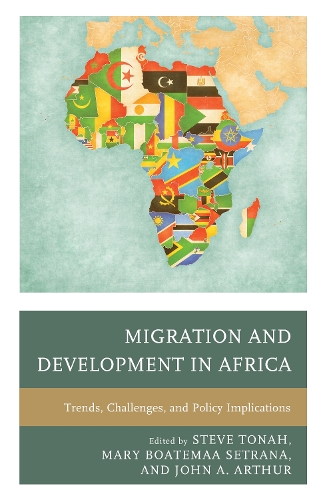
Migration and Development in Africa: Trends, Challenges, and Policy Implications
(Hardback)
Publishing Details
Migration and Development in Africa: Trends, Challenges, and Policy Implications
By (Author) Steve Tonah
Edited by Mary Boatemaa Setrana
Edited by John A. Arthur
Contributions by Richard Kwabena Owusu Kyei
Contributions by Danielle Minteu Kadje
Contributions by Leander Kandilige
Contributions by Theophilus Kwabena Abutima
Contributions by Peter Bilson Obour
Contributions by Omon Merry Osiki
Contributions by Jane Mwanji
Bloomsbury Publishing PLC
Lexington Books
28th August 2017
United States
Classifications
Professional and Scholarly
Non Fiction
Regional / International studies
Globalization
Central / national / federal government policies
Society and culture: general
Migration, immigration and emigration
Development studies
304.8096
Physical Properties
Hardback
210
Width 160mm, Height 237mm, Spine 21mm
490g
Description
There are only a few studies that analyze the complex relationship between Migration and development in Africa. The book presents the main trends in African migration since the last two decades. It analyzes the major migration trends, the various migration hubs across the continent and the underlying factors explaining the changing nature of migration across the continent. A few of the chapters in the book examine the phenomenon of migration from a national perspective by focusing on migration trends in countries such as Ghana, Cameroon, Kenya, and Nigeria. Two chapters examine the migration links between Africa and Europe with one of them focusing on the political links between Ghana and the Netherlands while the other focuses on economic exchanges between the Cameroonian diaspora in Germany and selected groups and organizations in Cameroon. The uniqueness of this book lies in the varied disciplinary viewpoints used by the authors in explaining the phenomenon of migration and development in Africa. The authors are specialists in the fields of sociology, anthropology, geography, history, philosophy and migration studies. Examining migration from so many different perspectives enriches the analysis and brings in new insights that would otherwise have been missing with the use of a single disciplinary perspective. The book recommends the need for policy coordination by national governments of both origin and destination countries to manage the size and composition of migrants. Most migrant-receiving countries prefer to receive professionals and persons with the required skills and training while keeping out the bulk of untrained and lowly-skilled persons. The result of this is that most migrants leave their countries and enter their destination countries illegally, swelling the numbers of undocumented immigrants.
Reviews
Combining sharp theoretical and empirical analyses with detailed contemporary and historical insights, this book examines the main features and implications of the migration-development nexus in the African context. The book is remarkably straightforward and lucidly written. Indeed, it is hard to know what to admire most about it its multidisciplinary approach, its thorough analysis, or the sheer elegance with which all the chapters come together in a coherent whole. Every serious student of migration will need to read this book. -- Joseph Mensah, York University
A book on the subject of migration and development can only catch the attention of a variety of readers if it is innovative in a number of ways, and this is the strength of this volume. It has diverse topics that have been carefully selected to cover the subject comprehensively. The reader will find the variety of the disciplinary backgrounds of the authors and methodologies employed as the volumes greatest strength and attractiveness. The issues examined include longstanding ones such as the brain drain and brain gain. The discussion on rural development resulting from diaspora associational activities is a specific area in the migration and development discourse that will be welcome by policy makers. Some concepts that have recently emerged or are receiving greater attention now in the field of study are not excluded in this volume, and they make it interesting: associational life of migrants, political participation of trans-migrants, repatriation, climate change and migration, among others. The volume is relevant to both the policy maker and academic researcher that need to know more about the migration-development nexus apart from the development effects of migration. -- Delali Badasu, Director, Centre for Migration Studies, University of Ghana
Author Bio
Steve Tonah is professor in the Department of Sociology, University of Ghana. Mary Boatemaa Setrana is lecturer at the Centre for Migration Studies, University of Ghana. John A. Arthur was professor of sociology and anthropology at University of Minnesota Duluth.
